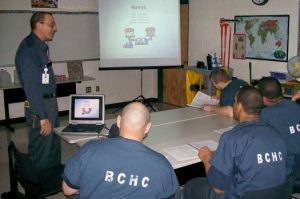Programs & Treatment
Education Programs
The Berkshire County House of Correction offers a variety of education options for incarcerated adult learners. The goals are to increase reading skills, assist inmates in passing the General Educational Development (GED) exam and develop computer competency. All programs are designed to help reduce recidivism by increasing literacy and life skills. Education is a valuable tool for raising self esteem and increasing the chance for an inmate’s successful return to society.
 ADULT BASIC EDUCATION/GED PREPARATION — Instruction is provided in reading, writing and math to meet individual student needs. Social studies or science may also be included. Students are assessed and specific needs identified in preparation for taking the GED exam, which is administered at BCHC by the Testing Center of Berkshire Community College. By passing the GED exam, a person earns a high school equivalency diploma.
ADULT BASIC EDUCATION/GED PREPARATION — Instruction is provided in reading, writing and math to meet individual student needs. Social studies or science may also be included. Students are assessed and specific needs identified in preparation for taking the GED exam, which is administered at BCHC by the Testing Center of Berkshire Community College. By passing the GED exam, a person earns a high school equivalency diploma.- WILSON READING PROGRAM — This program is designed for students who experience difficulty with written language in the areas of decoding and spelling. Individuals or small groups participate to gain skills to read at a higher level.
- EDUCATION COUNSELING — Students receive testing, counseling and reintegration services. Individual goals are set and schedules developed. Students take a TABE Reading Test to determine educational needs. Students are assessed for aftercare education services, referrals are processed and our staff provides testing oversight and helps facilitate college admissions.
- COMPUTER LITERACY — Students are assisted with learning, re-learning or reviewing basic keyboard skills.
- LIFE SKILLS — To help inmates with a successful return to the community, they are taught skills including job search (resume writing, job application completion), money management (credit card and banking information), shopping, apartment hunting and on-the-job behavior.
- CREATIVE WRITING — Students are motivated to learn through writing passages, poetry and reading books. This program has published a newsletter which has included student articles, poems and art.
- ART — To foster creativity, students learn the basics, and their work is displayed to increase motivation and self-esteem.
Vocational Training
Inmates at the Berkshire County House of Correction have the opportunity to study Graphics Communications skills. Opportunities include desktop publishing, use of laser jet printers and scanners, digital duplicators and laser copiers. Skills learned in this program translate into occupational employment opportunities upon release.
R.S.A.T. Program
In 2002, the Berkshire County Jail and House of Correction instituted a Residential Substance Abuse Treatment (RSAT) program as a separate housing unit at the House of Correction.
The RSAT mission is to assist participants in developing the framework to evaluate the impact of substance abuse and criminal behavior in their lives. Ultimately, this will allow the RSAT participant to return to the community as a productive citizen who will no longer engage in substance abuse related criminal behavior. The RSAT unit is a comprehensive substance abuse treatment program for individuals who have been identified as having a history of substance abuse behaviors associated with criminal behavior.
The RSAT criteria requires that inmates:
- take part for 6 to 12 months;
- live separately from the general population;
- focus substantially on substance abuse treatment needs;
- agree to drug testing;
- have an identified treatment plan in which progress can be tracked and monitored;
- are motivated for change, which is the most important requirement.
Substance Abuse Programs
The Berkshire County Sheriff’s Office recognizes the value of rehabilitation and changing the lives of people so they can return to their communities and be positive, productive citizens. More often than not, criminal behavior is associated with substance abuse.
Each inmate is screened and assessed by a substance abuse counselor to identify needs and determine how the program can help. A treatment plan is designed to identify goals and methods to achieve success, with a clear time line of inmate involvement in the program the inmate has agreed to.
The program can includes individual and/or group sessions in step programs, recovery education, addiction education, relapse prevention, living sober, women’s issues, Alcoholics Anonymous, Narcotics Anonymous and Al-Anon.
The one requirement for participation and membership in these groups is a desire to stop drugging and drinking or both.
 Community Service Program
Community Service Program
Each year, the Sheriff’s Office Community Service Program donates thousands of hours of inmate labor to Berkshire County communities and non-profit groups, saving these groups many thousands of dollars for needed projects. Eligible inmates may qualify to participate in these Community Service details outside the facility under the direct supervision of a community service officer. An inmate’s past criminal history, adjustment to the facility, work history at the facility, disciplinary history and program involvement will be taken into account before the inmate is chosen to take part in Community Service. Inmates who succeed in the Community Service Program can be considered for the Work Release Program.
Work Release
An inmate within twelve months of parole eligibility or release may be considered for the Work Release Program, a highly structured program which allows inmates to leave the correctional facility to take part in gainful employment with a local employer. Inmates will be required to do Community Service or facility jobs for at least 30 days before they will be eligible for the Work Release Program.
Furlough
The Sheriff may grant authorization for a committed offender to leave his place of confinement for a period of time not to exceed 7 days at any one time or 14 days in a 12-month period. Furloughs may be granted for an inmate to attend the funeral of a relative; to visit a critically ill relative; to obtain medical, psychiatric or other social services not available at the facility or obtainable in a hospital to which inmates may ordinarily be sent on a temporary basis; to contact prospective employers; to secure suitable residence for use when paroled or discharged or for any other reason consistent with the reintegration of a committed offender into the community. No inmate will be allowed to go out of Massachusetts on any furlough.
